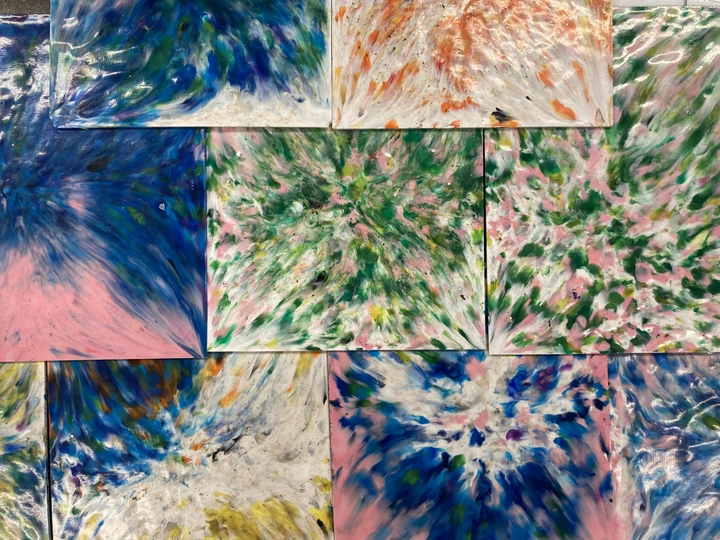Zero Waste Collab: Design Experiments in Reuse

I am currently completing my DLA at the Budapest University of Technology and Economics (BME), Faculty of Architecture. Since 2019, I have also been teaching as a guest lecturer at BME, contributing to design studios and courses focused on sustainability and material experimentation. My work lies at the intersection of material research, environmental ethics, and participatory design, with a specific focus on plastic waste and its potential reintegration into the built environment.
My ongoing research project explores the architectural applications of recycled plastic through both speculative design and hands-on prototyping. Drawing inspiration from the Precious Plastic movement, I experiment with low-tech fabrication methods such as heat pressing and extrusion. These efforts are accompanied by educational workshops, exhibitions, and community engagement initiatives that invite collaboration between designers, researchers, and local citizens.
In addition to my academic and research work, my architectural practice focuses on sustainable renovation and the adaptive reuse of existing buildings. I believe that reimagining and repurposing our built heritage is a key strategy in addressing both environmental and cultural challenges.
I have collaborated with international initiatives such as Precious Plastic Porto and Critical Concrete, both of which have influenced my thinking around open-source knowledge, decentralized production, and architecture as a social practice.
I aim to bridge gaps between academia, design culture, and civic participation by developing frameworks that combine material reuse with shared authorship and localized production. As a solo researcher with a collaborative mindset, I see my role as both initiator and connector, creating opportunities for meaningful exchange around the shared challenge of ecological transition, to imagine and build a more resource-conscious future.
Zero Waste Collab is a research-based initiative that reimagines plastic waste as a valuable resource in architecture through experimental prototyping and community education. Launched during my doctoral research at the Budapest University of Technology and Economics (BME), the project addresses the environmental challenges posed by plastic pollution, while proposing low-tech, creative pathways for circular material use in the built environment.
Drawing initial inspiration from the open-source Precious Plastic network, I began developing processes for heat-pressing and extruding recycled plastic into façade-scale cladding elements, with special attention to UV and fire protection. These experiments were not limited to the lab: workshops with students, designers, and local residents became a central method, allowing knowledge to circulate between academic research, material practice, and public engagement.
At its core, Zero Waste Collab is both an educational platform and a material testing ground. It builds bridges between architecture, design, and environmental responsibility by involving artistic and research institutions as hosts for collaborative making. Public exhibitions, lectures, and shared prototyping sessions create space for dialogue and co-creation—empowering participants to rethink waste, value, and the aesthetics of reuse.
The project envisions its next phase as a mobile plastics lab and educational tool that can activate new communities across Europe. By forming connections between universities, cultural spaces, and grassroots networks, Zero Waste Collab seeks to nurture a collective, open-ended exploration of circular design in architecture—shaped not only by innovation, but by participation.